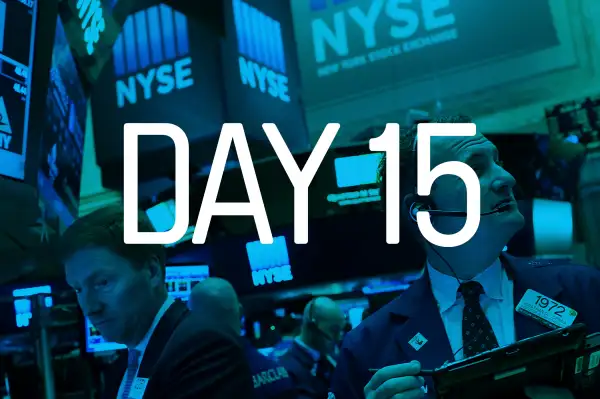Make Friends With the Stock Market

This is the Day 15 challenge in the #Money30, a month-long bootcamp for personal finance novices. You can read more about the challenge here, and follow along with us on Twitter, Instagram, or email us at feedback@moneymail.com.
TIME BUDGET: 30 minutes
Congrats! You've made it halfway through the #Money30. By now, you've learned the basics and saved some easy money. Now it's time to move beyond saving money that's already yours, and make more of it.
As far as making money goes, relying on a paycheck from your day job is pretty limiting. Sure, you can ask for a raise every now and then, but with wages remaining fairly stagnant for decades and the average raise clocking in at no more than 2.6% to 4.6% annually, most of us with sub-six-figure salaries need to find alternative forms of compensation to pad our bank accounts.
That's where investing comes in. While popular culture may make Wall Street and the trading that goes on there seem reserved for the monied elite, in actuality anyone can become a successful investor.
"Investing even small amounts of money early can be worth much, much more than investing larger amounts later in life," writes Jason Hall of the Motley Fool.
If I’d managed to invest $5,000 by age 25, and put that five grand in a low-cost index fund that tracks the S&P 500, by age 45, that $5,000 would be worth more than $33,000.
Over the course of a lifetime, the investments you make at a young age can add up to well into six figures—perhaps even seven if you're savvy enough. Use any compound interest calculator, and you can see that investing even $100 per month over the next 40 years will be worth far more than $48,000. Actually, assuming a 5% real return, you'd wind up with $148,856. That's a ton of money you're potentially leaving on the table.
Scott Moffitt, the president and CEO of Summit Financial Group, says after building up an emergency fund with at least three to six month's living expenses, the next financial step a millennial should take is investing any excess cash. Even $50 is enough to get started with some low-cost mutual funds.
One of the biggest benefits, according to Moffitt, is that eventually you'll have a source of money to spend on other things, like a house or car, that would otherwise seem out of your price range based on job earnings alone. Rather than relying on your paycheck, you're building wealth.
"Those that are investing early on are getting the benefit of their money compounding and [generating] generous returns," says Moffitt. "That allows them to cash-flow things that others simply cannot do through their income at that time."
Millennials, for their part, are aware of the possibilities: According to a recent BlackRock survey, they are the most likely generation to be planning to make a new investment or add to their investments in the next 12 months.
Moffitt is quick to note, however, that investing won't make you rich overnight. The point of making friends with the stock market early in your career is that you'll have decades to ride out the volatility of the market and come out on top. And of course, the earlier you invest and the longer you wait to cash out, the more time your returns have to grow.
"Early on, if they can get in that habit of taking 15% of their income right off of the top and learn to live without that and invest it, that will go a long way," he says. "It's amazing the difference that it has on a portfolio's size simply by starting at 23 or 24 versus 33 or 34. By the time you're in retirement you can have hundreds and hundreds of thousands of dollars more."
But how do you actually start investing? The first thing to do is make sure you are enrolled in your employer's 401(k) plan. We'll have more information on 401(k) plans on Day 17, but first the basics: a 401(k) is an employer-sponsored retirement account where your money is invested, typically, in mutual funds composed of stocks and bonds. Many employers match your contributions up to a certain dollar amount to incentivize you to save for retirement, so make sure you are contributing the maximum to your 401(k) to get what is essentially free money from your employer.
If you don't have a full-time job, or your employer doesn't offer a 401(k), you can also open an Individual Retirement Account (IRA).
In either case you'll have to make some decisions about how your money is invested. "When they're first starting out, whether it's through their employer or on their own, starting with a mutual fund or index fund that covers a broad spectrum of the U.S. market is a good way to start," Moffitt says. He notes that if you are just starting out in your career, you likely don't need a financial adviser. "There are online opportunities to start your investing."
For a minimal cost, so-called robo-advisers like Acorn, Wealthfront, and Betterment can help you set up a portfolio appropriate for your age, your goals, and your risk tolerance. Are you saving for retirement, for example, or something more short-term like a down payment on a home? Are you a conservative investor, or willing to take on more risk? Questions like those will help you determine your asset allocation, or how your portfolio is structured.
Finally, make sure your debt is manageable, meaning you have a payment plan in place. That doesn't mean waiting until you're completely out of debt—including student loan debt—to start investing, according to Moffitt. You'll be missing out on an opportunity to build wealth if you do.
Finally, be patient. Investing isn't a get-rich-quick scheme, it's more of a long-term relationship.
—Alicia Adamczyk
Have a question, comment, or suggestion? Email us at feedback@moneymail.com.